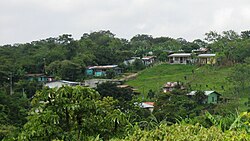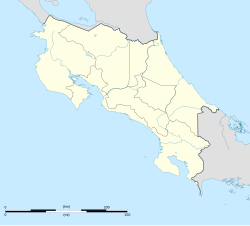Purabá is a district of the Santa Bárbara canton, in the Heredia province of Costa Rica.[1][2] The district consists of several large neighborhoods: San Bosco (Bosconia), Marías, Purabá, Lajas, and Calle Quirós.
Purabá | |
|---|---|
 A neighborhood in Purabá de Santa Bárbara | |
 Purabá district | |
| Coordinates: 10°03′58″N 84°09′03″W / 10.0662393°N 84.1509519°W | |
| Country | |
| Province | Heredia |
| Canton | Santa Bárbara |
| Creation | 2 September 1976 |
| Area | |
• Total | 6.09 km2 (2.35 sq mi) |
| Elevation | 1,240 m (4,070 ft) |
| Population (2011) | |
• Total | 4,573 |
| • Density | 750/km2 (1,900/sq mi) |
| Demonym(s) | Vecino de Purabá, Purabáeño |
| Time zone | UTC−06:00 |
| Postal code | 40406 |
History
editPurabá was created on 2 September 1976 by Decreto Ejecutivo 6370-G. Segregated from Santo Domingo.[2]
Like the rest of the canton, the area now known as Villa Jesús was originally occupied before the Spanish settlers came by the Huetares, an indigenous tribe. The Huetare King, Cacique Garabito, dominated the area.[3]
In early 1663, settler Joseph de Sandoval Ocampo set up cattle ranches in the area, including one toward the between the present-day areas of San Pedro and Purabá, which was called Tapatalanga or Anonos at the time.[4] Heredia, Barva, and Alajuela, three neighboring cities, were populated and settled in the late 1700s. As trade increased between the three cities, the canton developed.[5]
Recalling her childhood of making dolls out of plantain leaves in Purabá, former teacher María Cecilia Alfaro Víquez, born in 1940, said that the roads were made of pebbles and dirt.[6] The culture and economy of sugarcane production was so widespread that even children like Alfaro Víquez made toy sugar mills.[6] In 1949, a bridge was constructed in the district, blessed by the local Catholic priest.[7]
Purabá is the newest district in Santa Bárbara, created in 1976.[5]2 The backbone of Purabá's economy is agricultural production, particularly sugarcane cultivation,[5] even though sugarcane grows best at lower elevations.[8] Up until 1975, Ingenio Agroindustrial Las Marías was a buyer of agricultural products for domestic consumption, but it moved to Grecia in 1975.
Geography
editPurabá has an area of 6.09 km2[9] and an elevation of 1,240 metres.[1]
Like much of Costa Rica, the Comisión Nacional de Prevención de Riesgos (National Risk Prevention Commission) puts Purabá in a high-risk zone.[10] This is due to the district's mountainous geography, which can lead to landslides and flooding.[10] The highest part of Purabá is on the lower slopes of the Barva Massif, also known as Barva Volcano, at 2.400 metres (7.87 ft) above sea level.[11][12] The lowest part, at San Juan, is at 1.000 metre (3.281 ft) above sea level.[11] The Barva volcanic massif is part of a mountain range which includes volcanic cones. So part of Purabá de Santa Bárbara is in the foothills of Barva Volcano.[12] Several large rivers run through Purabá. These include Quebrada Setillal, Rio Ciruelas, Rio Pacayas, Rio Dorita.[13] In 2010, the canton outlined plans to prevent future natural disasters in the district.[14]
Economy
editPurabá's real estate holdings, private, public, and ecclesiastic, are assessed according to national law.[15] There are various commercial businesses in Purabá, including a pharmacy, restaurants and corner stores.[16][17]
In 2010 the Santa Bárbara canton planned to improve Purabá's environmental protections with the goal of improving tourism.[14] The plans include reforestation, cleaning rivers, and setting up protected areas.[14]
Public and social services
editAn EBAIS, Equipo Básico de Atención Integral en Salud (Basic Medical Care Center), is located in the San Bosco neighborhood, serving residents and non-residents of the district.[18] The Catholic Church serves the region through the Archdiocese of Alajuela.[19][20] In Purabá, there is a public cemetery maintained by the canton.[21]
The district is partially electrified by the Instituto Costarricense de Electricidad.[22] Like many areas of the country, at various times, Purabá has suffered from problems with water distribution, despite the 24 springs and wells that exist in the area.[23] Because of these problems, the canton created plans to improve Purabá's water distribution before 2020 by improving delivery and building a water treatment plant.[14]
There are three elementary schools that serve the entire district: Escuela Don Bosco, Escuela Rodolfo Peter Sheider, and Calle Quirós.[24] By 2020, the district would like to expand the gyms of Escuela Don Bosco and Escuela Rodolfo Peter Sheider, as well as add a computer lab to Escuela Rodolfo Peter Sheider.[14] In addition to serving as schools, Escuela Don Bosco and Escuela Rodolfo also serve as voting centers during general elections and primaries.[25] Students from the district usually attend Colegio Santa Bárbara High School,[26] but may also go to the high schools in Barva or Heredia.
Demographics
edit| Census | Pop. | ±% p.a. |
|---|---|---|
| 1984 | 2,070 | — |
| 2000 | 3,600 | +3.52% |
| 2011 | 4,573 | +2.20% |
| 2022 | 6,101 | +2.66% |
| Source: Instituto Nacional de Estadística y Censos[27] Centro Centroamericano de Población[28] | ||
For the 2011 census, Purabá had a population of 4,573 inhabitants. [29]
Transportation
editRoad transportation
editThe district is covered by the following road routes:
References
edit- ^ a b "Declara oficial para efectos administrativos, la aprobación de la División Territorial Administrativa de la República N°41548-MGP". Sistema Costarricense de Información Jurídica (in Spanish). 19 March 2019. Retrieved 26 September 2020.
- ^ a b División Territorial Administrativa de la República de Costa Rica (PDF) (in Spanish). Editorial Digital de la Imprenta Nacional. 8 March 2017. ISBN 978-9977-58-477-5.
- ^ "Reseña Histórica del Cantón". Municipalidad de Santa Bárbara (in Spanish). 2010. Retrieved 23 May 2014.
- ^ Hernández Vargas, Rose Marie (6 November 2013). "Reseña histórica de Santa Bárbara de Heredia" (in Spanish). Extensión en acción. Universidad Estatal a Distancia. Retrieved 5 June 2014.
- ^ a b c Centenario del cantón Santa Bárbara de Heredia. 1982.[permanent dead link]
- ^ a b Arguedas Ramírez, Krisly (10 March 2012). "Eterna niña..." (in Spanish). Santa Bárbara de Heredia, Costa Rica: Santa Bárbara: Una Comunidad Activa. Retrieved 8 June 2014.
- ^ "Construccion del Puente Zetillal 1949". Santa Bárbara: Una Comunidad Activa (in Spanish). Retrieved 7 June 2014.
- ^ "Sugarcane Climate". Netafim's Agriculture Department. Retrieved 14 June 2014.
- ^ "Área en kilómetros cuadrados, según provincia, cantón y distrito administrativo". Instituto Nacional de Estadística y Censos (in Spanish). Archived from the original on 24 October 2020. Retrieved 26 September 2020.
- ^ a b "AMENAZAS NATURALES CANTON DE SANTA BARBARA". Comisión Nacional de Prevención de Riesgos y Atención de Emergencias (in Spanish). San Jose: Comisión Nacional de Prevención de Riesgos y Atención de Emergencias. Archived from the original on 2 December 2013. Retrieved 5 June 2014.
- ^ a b Municipalidad de Santa Barbara: Datos generales Archived 2014-04-29 at the Wayback Machine Retrieved 10 July 2014
- ^ a b "Filling the gap of Turdus nigrescens Aves Turdidae distribution, first record in Barva Volcano, Costa Rica", by Luis Sandoval1 and Melania Fernández, 2009 Retrieved 10 July 2014
- ^ "Mapas del cantón". Municipalidad de Santa Bárbara 2010 (in Spanish). Municipalidad de Santa Bárbara. Archived from the original on 14 July 2014. Retrieved 8 June 2014.
- ^ a b c d e Plan de Desarrollo Humano Local 2010-2020, Cantón Santa Bárbara (in Spanish). Proyecto de Fortalecimiento Municipal y Descentralización. August 2009. Archived from the original on 5 June 2014. Retrieved 27 May 2014.
- ^ "Decretos por declaración de zonas catastradas" (in Spanish). La Gaceta. 24 September 2013. Retrieved 7 June 2014.
- ^ "Santa Bárbara Digital: Directorio Comercial: Santa Barbara de Heredia, Retrieved: May 20, 2014".
{{cite web}}: External link in|title=|url=(help) - ^ Láscarez, Carlos (9 October 2012). "Tenían a menor como esclava". Al Dia (in Spanish). San Jose. Retrieved 28 May 2014.
- ^ "Dirección de Compra de Servicios de Salud" (in Spanish). Área de Salud Santa Bárbara. Retrieved 7 June 2014.
- ^ "Parroquia Santa Bárbara (Santa Bárbara de Heredia)". Diócesis de Alajuela. Alajuela, Costa Rica. 17 October 2013. Archived from the original on 21 February 2014. Retrieved 5 June 2014.
- ^ "Iglesia Católica de Purabá". Santa Bárbara: Una Comunidad Activa (in Spanish). Retrieved 7 June 2014.
- ^ Plan Estratégico Municipalidad de Santa Bárbara , 2010 - 2015 (PDF) (in Spanish) (1 ed.). Municipalidad de Santa Bárbara y Proyecto Fortalecimiento de las Capacidades Municipales para la Planificación d el Desarrollo Humano Local en Costa Rica. August 2009. Retrieved 7 June 2014.
- ^ "Santa Bárbara, Santo Domingo (Total), Purabá y Jesús (parcial)". Compañía Nacional de Fuerza y Luz. Retrieved 7 June 2014.[permanent dead link]
- ^ Mora, Emilia (20 December 2003). "Agua genera polémica en cantón de Santa Bárbara" (in Spanish). San Jose: La Nacion. Retrieved 8 June 2014.
- ^ Ministerio de Educación Pública: Ministerio de Educación Pública, accessdate: 27 May 2014
- ^ "Centros de votación Heredia" (in Spanish). San Jose: La Nacion. 2002. Retrieved 8 June 2014.
- ^ Ministerio de Educación Pública: Santa Bárbara | Ministerio de Educación Pública Archived 2014-05-20 at the Wayback Machine, accessdate: 27 May 2014
- ^ "Instituto Nacional de Estadística y Censos" (in Spanish).
- ^ Centro Centroamericano de Población de la Universidad de Costa Rica. "Sistema de Consulta a Bases de Datos Estadísticas" (in Spanish).
- ^ "Censo. 2011. Población total por zona y sexo, según provincia, cantón y distrito". Instituto Nacional de Estadística y Censos (in Spanish). Retrieved 26 September 2020.
